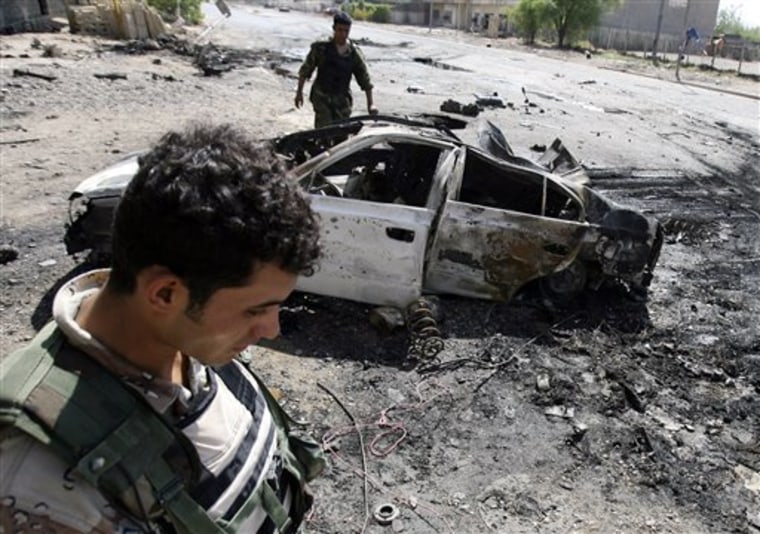A booby-trapped bicycle exploded near a cafe serving tea and food during Ramadan fasting hours Sunday, killing at least five people in a religiously mixed area in northern Iraq, police said.
Dozens of fighters linked to the Sunni-dominated al-Qaida in Iraq streamed into Shiite villages north of Baghdad, torching homes and killing at least 15 residents, police and army officials said.
In the raids on the villages of Jichan and Ghizlayat, the fighters arrived from several different directions and residents fought back until Iraqi security forces arrived and chased the attackers, who fled to nearby farms.
The clashes about 60 miles north of Baghdad lasted about two hours, the officials and witnesses said. They spoke on condition of anonymity because they feared reprisals.
In all, at least 39 people were killed or found dead nationwide. The bloodshed came the day after al-Qaida in Iraq announced a new offensive in the Islamic holy month and was a blow to government hopes that a peaceful Ramadan would demonstrate the success of the seven-month operation in the capital.
Separately, a suspected al-Qaida in Iraq fighter believed responsible for the assassination of a U.S.-allied Sunni sheik was arrested north of the capital, the military said Sunday.
In the late-morning blast in Tuz Khormato, 130 miles north of Baghdad, witnesses said a boy left the bicycle bomb near the cafe, which was located in a popular market and was one of the few open during daylight hours despite Ramadan. Tradition requires faithful to abstain from eating and drinking from sunrise to sunset during the monthlong observance.
Two of the slain victims were in the cafe, while three were in the market, police chief Capt. Abbas Mohammed said. He also said 19 people were wounded.
No one claimed responsibility for the attack.
Political crisis grows worse
The government, meanwhile, faced a deepening political crisis with Saturday's announcement that anti-U.S. cleric Muqtada al-Sadr's followers were withdrawing from the Shiite alliance in parliament. Al-Sadr's followers hold 30 of the 275 parliament seats.
The announcement, made to reporters in Najaf, means the Shiite-led government can count on the support of only 108 parliament members — 30 short of a majority. However, it could probably win the backing of the 30 independent Shiite parliamentarians, as well as some minor parties.
Still, the decision by al-Sadr's followers will complicate further U.S.-backed efforts to win parliamentary approval of power-sharing legislation, including the oil bill and an easing of curbs that prevent former Saddam Hussein supporters from holding government jobs.
An adviser in the prime minister's office, Sadiq al-Rikabi, played down the significance of the departure.
"It is the right of political forces to form coalitions among each other on the condition that they don't endanger the nation and people's security," al-Rikabi said. "The Sadrist bloc was not supportive of the government in the past months."
He acknowledged the Sadrists were likely to vote against government-backed laws: "We don't expect much from them now."
Sadrists' bolted after warrants
Al-Sadr's decision will also sharpen the power struggle among armed Shiite groups in the south, which includes major Shiite religious shrines and much of the country's vast oil resources.
The Sadrists had been threatening to bolt the Shiite alliance for several days. But tensions rose after arrest warrants were issued against Sadrist officials in the holy city of Karbala in connection with last month's Shiite factional fighting there.
The warrants, which were made public Saturday, angered the Sadrists, who said the government was provoking them despite recent gestures by al-Sadr, including a six-month halt to military operations by his Mahdi Army militia.
Shiites have shown signs of increasing frustration with militia violence, much of it blamed on breakaway Mahdi Army factions and criminal gangs and extortion rings.
Internal Shiite clashes broke out at a market in the Hamzah al-Gharbi area near Hillah, about 60 miles south of Baghdad, when shop owners from the Albu Jassim tribe fought back against militia fighters, leaving one civilian dead, a provincial police official said. The bullet-riddled bodies of a traffic police chief and his 11-year-old son also were found after they were kidnapped during the fighting, the official said, speaking on condition of anonymity because he was not authorized to release the information.
American commanders in southern Iraq have said Shiite sheiks are showing interest in joining forces with the U.S. military against extremists, in much the same way that Sunni clansmen in the western part of the country have worked with American forces against al-Qaida in Iraq.
One of those clansmen, Sheik Abdul-Sattar Abu Risha, was assassinated Thursday outside his compound in the Anbar capital of Ramadi, just days after he met with U.S. President Bush.
The U.S. military said an al-Qaida linked militant believed responsible for his death — Fallah Khalifa Hiyas Fayyas al-Jumayli, an Iraqi also known as Abu Khamis — was seized Saturday.
"We do not assess that he was operating alone, there is an investigation and continuing operations that are focused on ensuring that all people who were involved in this attack or in this murder will be detained," said Rear. Adm. Mark Fox, a U.S. military spokesman.
